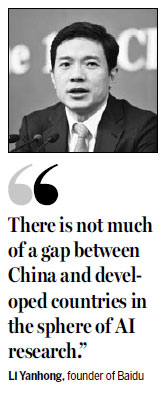China's leading search engine Baidu is investing heavily in developing artificial intelligence technologies, with more than 500 patent applications filed in the sector worldwide.
"Baidu is at the forefront of the world, especially in such pioneering fields as face and voice identification," said Su Jing, director of the company's patent strategy department.
It has more than 270 applications filed in neuro-linguistic programming, 120 in the deep learning (machine learning using algorithms) sector and scores of patents, as well as applications in big data, image identification and voice technologies.
The technologies are expected to end manual online search. Voices or smart phone cameras alone will help find out targeted information, according to the company.
"Such expertise will also be used in other sectors, such as unmanned aircraft or driverless vehicles," Su said.
Li Yanhong, founder of the high-tech company headquartered in Beijing, proposed developing "China's brain" when he was a delegate at a meeting of the National People's Congress in March.
He suggested the government build a massive research infrastructure open to industries, schools and research institutes.
"There is not much of a gap between China and developed countries in the sphere of AI research," he said.
"If there was a national complex strategy to advance AI-related technologies and industries, it would provide us with ideal opportunities to overtake competitors, give us an edge in comprehensive competitiveness and increase our country's influence," he said.
His own company moved in that direction when Baidu began to shift its focus on the link between people and information to that between people and services in 2012.
The company has conducted research into using computer technologies to simulate how a human brain works and makes a logical judgment when supplied with various data since 2013, Chinese media report.
Baidu's research and development spending surpassed 15.87 billion yuan ($2.56 billion) over the past five years, with annual average growth of more than 70 percent.
In 2014 alone, expenditure reached 6.99 billion yuan, some 14 percent of its yearly business revenue.
Such an enormous amount of capital flowing into research has much to do with the decision maker Li's belief in technological progress.
The techie founded Baidu in Zhongguancun, China's high-tech business hub, with his search engine patent granted in the United States in 1997.
"I'm willing to pour money into research; I don't care about Wall Street's opinion or a drop in share prices - I'm bound to make it," news portal Southern.com quoted him saying.
An IT patent report released by the Ministry of Industry and Information Technology at an intellectual property forum in Shenzhen, Guangdong province, in April shows that some 2.48 million IT patent applications were filed in China in the first half of last year, an 18.7 percent rise year-on-year.
Chinese dotcoms reported "explosive growth" in instant messaging, online payment and games, social media, cloud computing or big data, research engines, and Internet security in 2014, according to analysis of domestic Internet technological innovation jointly released by Peking University and the China Law Association on Science and Technology.
Baidu filed more than 1,000 patent applications last year, said Zhi Binwei, an official at the Zhongguancun administrative committee.
Zhou Qi, the company's senior IP adviser, told the media, "Our company is not the largest filer, but as a dotcom with a technology gene, it is rich in investment and output in such core technological fields as AI, which indicates that it has reached the dizzy heights of technology value."
wangxin@chinadaily.com.cn


